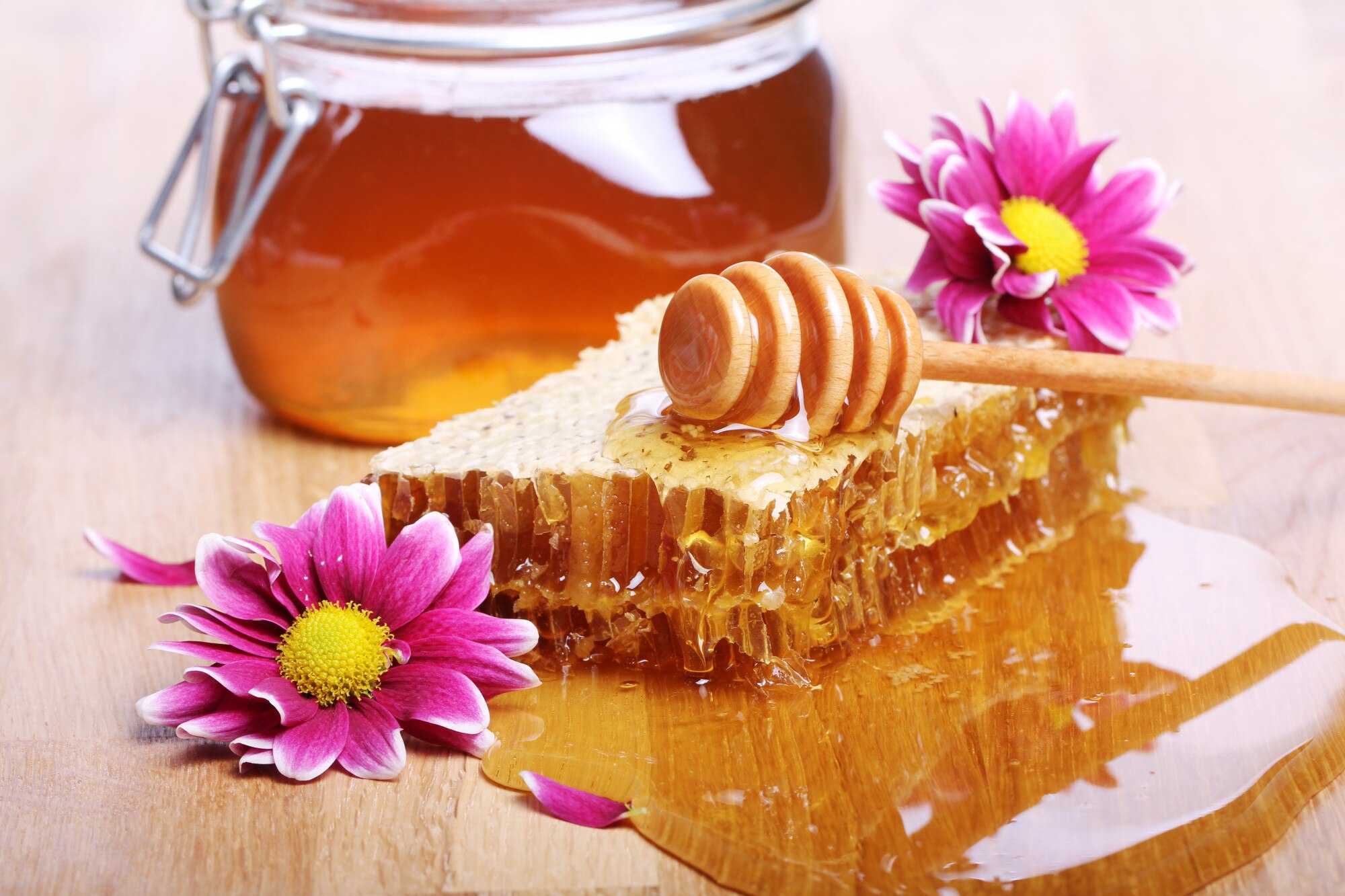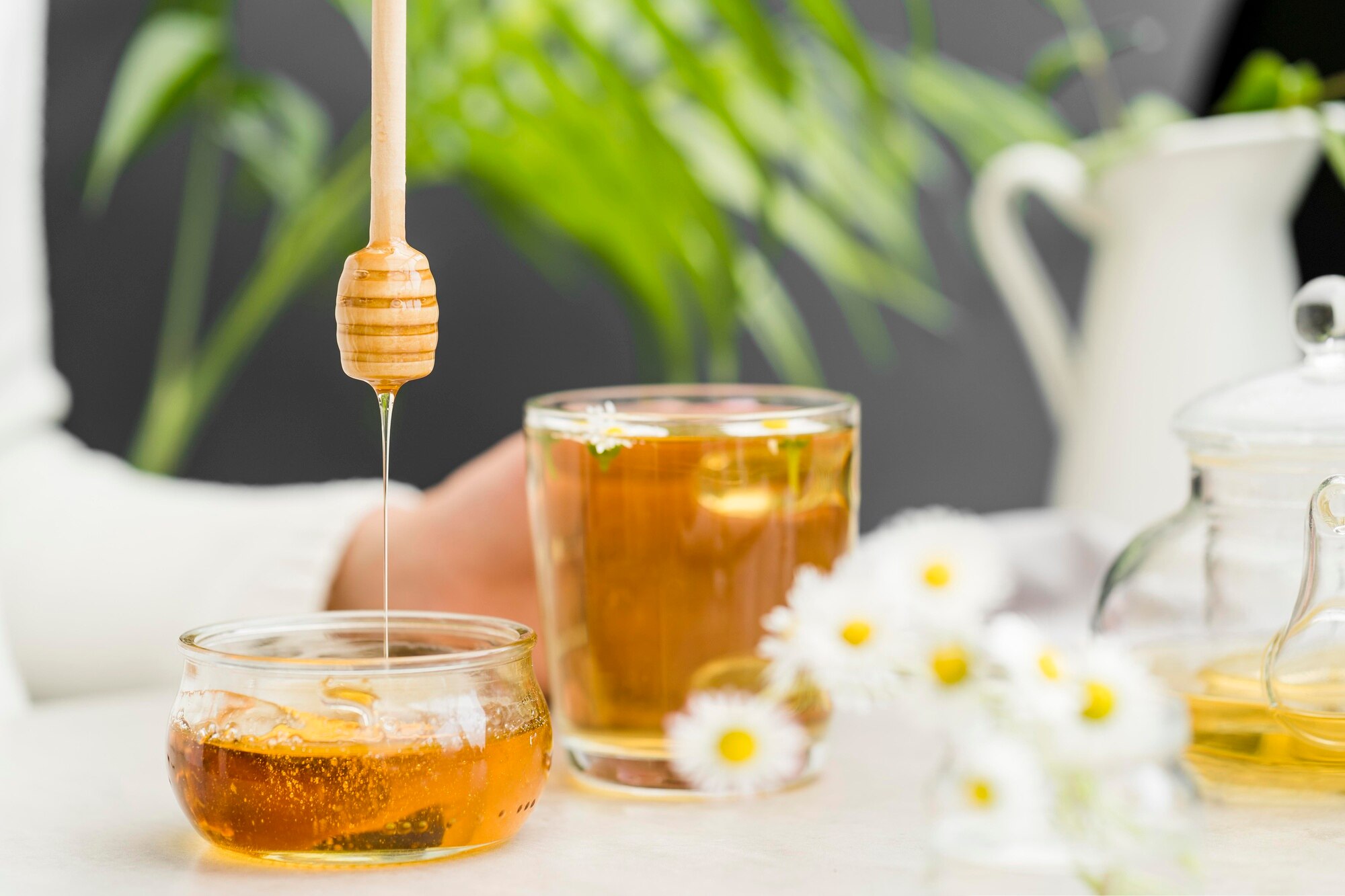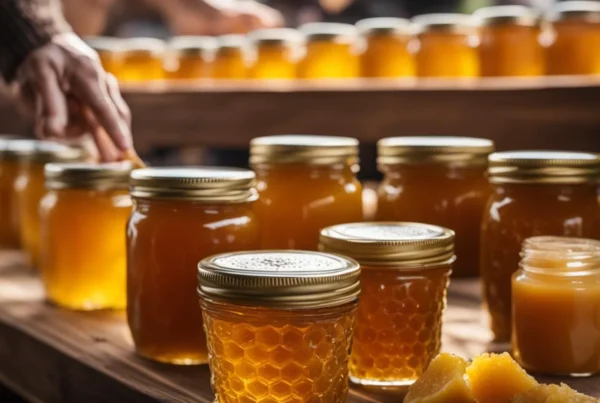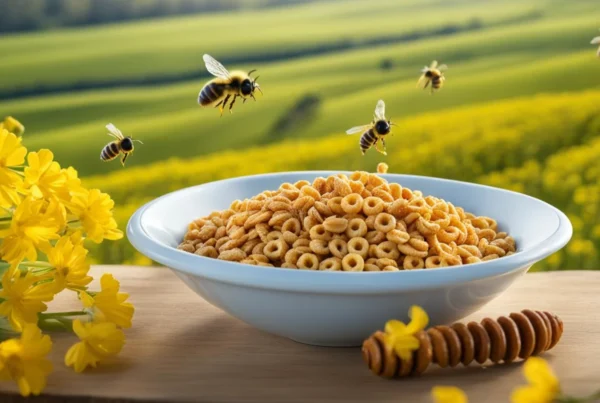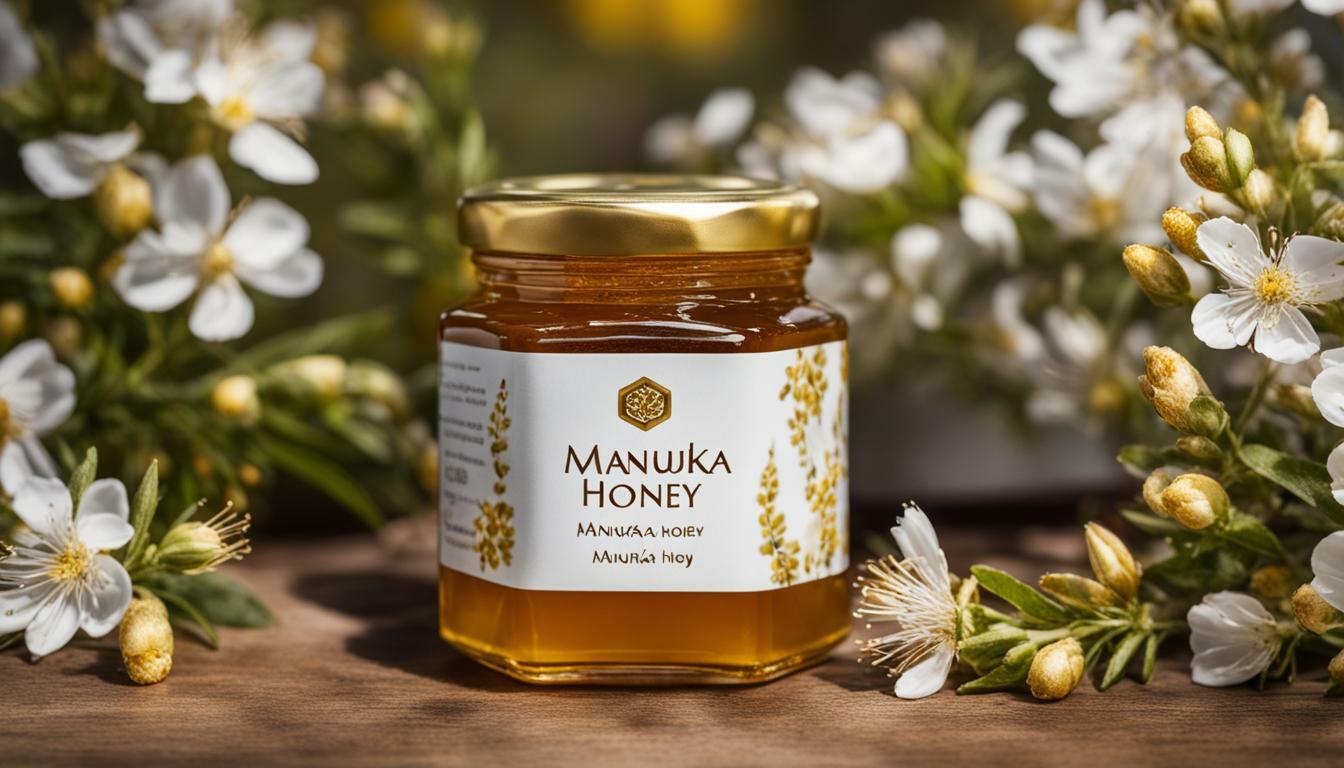
Manuka honey is a type of honey that is native to New Zealand and is known for its potent antibacterial properties. This golden nectar is not only delicious but also has a host of health benefits that make it a must-have in every kitchen.
In this section, we will explore the various health benefits of manuka honey, including its uses and how it can boost your overall wellness.
Key Takeaways
- Manuka honey is a type of honey native to New Zealand.
- It has potent antibacterial properties that make it a natural remedy for various ailments.
- Manuka honey can boost your overall wellness and enhance the health of your skin.
- It can also accelerate wound healing and soothe a sore throat.
- When choosing manuka honey, look for the UMF rating system to ensure you’re getting the best quality.
Why Manuka Honey?
Manuka honey is a unique type of honey that is primarily produced in New Zealand. It is known for its exceptional antibacterial and anti-inflammatory properties, making it a popular natural remedy for a range of health issues.
Unlike regular honey, which is produced from various flowers, manuka honey is made from the nectar of the manuka tree. This gives it distinct features that set it apart from other types of honey. In addition, manuka honey is produced without the use of pesticides or other harmful chemicals, making it completely organic.
One of the most significant features of manuka honey is that it is raw, which means that it is not processed in any way. This helps to retain its natural enzymes and nutrients, allowing it to provide maximum health benefits.
When it comes to choosing the best manuka honey, it is essential to look for one that has a high UMF (Unique Manuka Factor) rating. This rating system measures the potency of the honey’s antibacterial properties, with higher ratings indicating more potent antibacterial activity.
Why Choose Organic and Raw Manuka Honey?
Organic and raw manuka honey is the best choice for your health because it is free from harmful chemicals and has not been processed in any way. This means that it retains all of its natural enzymes and nutrients, which can provide a range of health benefits.
In addition, organic manuka honey is produced in a sustainable and environmentally friendly way, which helps to support the natural ecosystem and protect the bees that produce the honey. By choosing organic and raw manuka honey, you are supporting a healthier environment and promoting ethical beekeeping practices.
Overall, if you want to experience the full range of health benefits that manuka honey has to offer, choosing organic, raw, and high UMF rated manuka honey is the way to go.
Boost Your Immune System with Manuka Honey
Manuka honey is not only a delicious natural sweetener, but also an immune booster. Its antibacterial properties help to fight off harmful bacteria and viruses, while its anti-inflammatory properties reduce inflammation and strengthen your body’s defense system.
The unique compound methylglyoxal (MGO) found in manuka honey is responsible for its immune-boosting properties. MGO has been shown to be effective against several strains of bacteria, including those that are resistant to antibiotics.
Consuming manuka honey regularly can help improve your overall immune function, regulate digestion, and promote gut health. It’s an excellent addition to your daily diet, especially during cold and flu season.
How to Use Manuka Honey for Immune Support
Manuka honey can be consumed in several ways to support your immune system. You can stir it into your tea or coffee, spread it on toast, or add it to your smoothies and yogurt bowls.
You can also create a simple remedy by mixing manuka honey with warm water and a squeeze of lemon juice. This can help soothe a sore throat or alleviate common cold symptoms.
When purchasing manuka honey, be sure to look for the UMF (Unique Manuka Factor) rating on the label. This rating indicates the level of antibacterial activity in the honey, with higher ratings indicating stronger activity.
Overall, incorporating manuka honey into your diet can provide numerous health benefits, including immune support. Its natural antibacterial and anti-inflammatory properties make it an excellent choice for maintaining optimal wellness.
Manuka Honey for Skin Health
Manuka honey is not only beneficial for internal health but also for your skin. Its unique properties make it an excellent natural ingredient for various skin care products.
Moisturizing Properties
Manuka honey is a natural humectant, which means it draws moisture from the air into the skin. It helps your skin stay hydrated and supple, making it an ideal ingredient in moisturizers and lotions.
Anti-aging Properties
Manuka honey also has anti-aging properties due to its high antioxidant content. Antioxidants protect your skin from oxidative stress, which can cause wrinkles and other signs of aging. Regular use of manuka honey on your skin can help keep it looking youthful and healthy.
Antibacterial Properties
Manuka honey’s antibacterial properties help keep your skin free from harmful bacteria that can cause acne, infections, and other skin conditions. It is an effective natural remedy for treating acne and reducing inflammation.
Treatment of Skin Conditions
Manuka honey is also effective in treating various skin conditions, including eczema, psoriasis, and dermatitis. Its anti-inflammatory properties relieve symptoms of these conditions, while its antibacterial properties prevent bacterial infections.
Overall, manuka honey is an excellent natural ingredient for skin care products due to its unique properties. When looking for skin care products, you should consider those that contain this golden nectar.
Accelerate Wound Healing with Manuka Honey
Manuka honey has been used for centuries as a natural remedy for wound healing. Its unique antibacterial and anti-inflammatory properties make it an effective treatment for a variety of wounds and burns.
Studies have shown that manuka honey can create an optimal healing environment by promoting tissue regeneration and reducing inflammation. Its antibacterial properties also prevent infection and promote faster healing.
| Type of Wound | Manuka Honey Treatment |
|---|---|
| Cuts and Scratches | Apply manuka honey directly to the wound and cover with a bandage. Change the bandage and reapply the honey every 24 hours. |
| Burns | Apply a thin layer of manuka honey to the burn and cover with a sterile gauze. Change the gauze and reapply the honey every 24-48 hours. |
| Ulcers and Bed Sores | Apply manuka honey to the affected area and cover with a sterile bandage. Change the bandage and reapply the honey every 24 hours. |
It’s important to note that not all manuka honey products are created equal. Look for honey that has a UMF (Unique Manuka Factor) of at least 10+ for optimal healing benefits.
Consult with your healthcare provider if you have any concerns about using manuka honey for wound healing, and discontinue use if you experience any adverse reactions.
Soothe a Sore Throat with Manuka Honey
Manuka honey has long been used as a natural remedy for sore throats. Its antibacterial and anti-inflammatory properties can help soothe inflammation and ease pain. In addition, manuka honey is rich in antioxidants that can boost your immune system, further aiding in your body’s fight against infections.
When using manuka honey for a sore throat, it’s important to choose a high-quality, raw honey with a high UMF (Unique Manuka Factor) rating. This ensures that the honey contains the beneficial compounds that make it effective against bacterial infections.
How to Use Manuka Honey for Sore Throat Relief
There are several ways to incorporate manuka honey into your sore throat treatment:
- Mix 1-2 tablespoons of manuka honey into a cup of warm water and drink as a soothing tea.
- Take 1-2 teaspoons of manuka honey directly off the spoon and let it slowly coat your throat.
- Add manuka honey to your favorite herbal tea or warm lemon water for an extra boost of antibacterial power.
It’s also important to note that while manuka honey is generally safe for consumption, it can cause allergic reactions in some individuals. If you have a known allergy to honey, it’s best to avoid using manuka honey for sore throat relief.
Overall, manuka honey is a natural, effective remedy for soothing a sore throat. Its antibacterial and anti-inflammatory properties make it a powerful tool in your arsenal against infections, and its antioxidant content can help boost your overall immune health.
Incorporating Manuka Honey into Your Diet
Manuka honey is not only a natural remedy, but it’s also a delicious addition to your diet. Here are some creative ways to include manuka honey in your daily routine and enjoy its health benefits:
1. Sweetener
Use manuka honey as a sweetener in your morning coffee or tea instead of sugar or artificial sweeteners. Its unique flavor profile adds a touch of sweetness with a hint of earthiness.
2. Salad Dressing
Mix manuka honey with olive oil, apple cider vinegar, and Dijon mustard to create a healthy and flavorful salad dressing. It pairs especially well with bitter greens like arugula or radicchio.
3. Marinade
Marinate meats, tofu, or vegetables in a mixture of manuka honey, soy sauce, garlic, and ginger for a sweet and savory dish. The enzymes in the honey also help tenderize the meat.
4. Toast Topping
Spread manuka honey on whole-grain toast for a satisfying breakfast or snack. Add sliced banana or berries for extra flavor and nutrition.
5. Smoothie Ingredient
Add a spoonful of manuka honey to your favorite smoothie recipe for a natural boost of sweetness and immune-boosting benefits.
6. Baking
Replace sugar with manuka honey in your baking recipes for a healthier twist. It works especially well in muffins, cakes, and cookies.
With these creative ideas, incorporating manuka honey into your diet has never been easier. Try out different recipes and experiment with different combinations to find your favorite way to enjoy this golden nectar.
Choosing the Best Manuka Honey
When it comes to selecting the best manuka honey, there are several factors to consider to ensure you are getting a high-quality product that will provide you with the maximum health benefits.
The first thing to look for is the level of UMF, or Unique Manuka Factor, in the honey. UMF is a measurement of the honey’s antibacterial activity, which is what gives manuka honey its powerful health benefits. Look for a UMF level of at least 10+ for therapeutic use, though higher levels such as 15+ or 20+ may be more effective for certain health conditions.
It’s also important to choose raw, unprocessed manuka honey. This means the honey has not been heated or processed in any way that would strip away its natural enzymes and nutrients. Organic manuka honey is also a great choice, as it is free of harmful pesticides and chemicals.
When purchasing manuka honey, be sure to buy from a reputable source that can provide information on the honey’s origin and processing methods. Look for honey that is sourced from New Zealand, where the manuka plant is native, and has been independently tested for quality.
Ultimately, the best manuka honey for you will depend on your individual health needs and preferences. By considering the UMF level, processing methods, and source of the honey, you can make an informed decision and choose the best manuka honey for your lifestyle.
Safety Precautions and Possible Side Effects
Manuka honey is generally safe to consume for most people. However, it is important to be aware of potential side effects and safety precautions.
Individuals who are allergic to honey or bees may experience an allergic reaction to manuka honey. This can result in symptoms such as itching, hives, and swelling.
In rare cases, manuka honey may cause a condition called botulism in infants. This is caused by the presence of bacterial spores in the honey that can produce toxins in the baby’s immature digestive system. Therefore, it is recommended that infants under the age of one should not be given honey, including manuka honey.
Additionally, excessive consumption of manuka honey may result in gastrointestinal symptoms such as diarrhea, bloating, and stomach pain.
When consuming manuka honey for its health benefits, it is important to follow the recommended dosage instructions and consult with a healthcare professional if you have any concerns or pre-existing medical conditions.
Conclusion
Although manuka honey is generally considered to be a safe and beneficial natural remedy, it is important to exercise caution and be aware of the potential risks and side effects. By understanding the safety precautions and following the recommended dosage guidelines, you can safely enjoy the many health benefits of manuka honey as part of your wellness routine.
Manuka Honey Myths vs. Facts
Manuka honey has gained widespread popularity for its exceptional health benefits, but there are many myths surrounding this golden nectar. Let’s separate the facts from the misconceptions.
Myth: All honey is the same.
Fact: Manuka honey is different from other types of honey. It is produced by bees who pollinate the manuka bush in New Zealand, giving it unique antimicrobial properties.
Myth: Higher UMF ratings mean better quality honey.
Fact: UMF (Unique Manuka Factor) ratings indicate the level of non-peroxide activity in the honey, which is responsible for its antibacterial properties. However, higher ratings do not necessarily mean better quality honey. The ideal rating depends on the intended use and personal preference.
Myth: Manuka honey can cure cancer.
Fact: While manuka honey has many health benefits, there is no evidence to suggest it can cure cancer. It should be used as a complementary treatment, not a substitute for medical intervention.
Myth: Manuka honey is safe for everyone to consume.
Fact: Some people may be allergic to honey or experience side effects such as stomach upset. People with diabetes should also be cautious, as honey is high in sugar. It is important to consult a healthcare professional before consuming manuka honey regularly.
Myth: Manuka honey can be used as a substitute for antibiotics.
Fact: While manuka honey has antibacterial properties, it is not a substitute for antibiotics in serious infections. It may be used as a complementary treatment in minor infections or wound healing.
Myth: Manuka honey is a recent discovery.
Fact: Manuka honey has been used for centuries by indigenous people in New Zealand for its medicinal properties. It is only in recent years that its popularity has spread globally.
- Now that you know the facts about manuka honey, you can make informed decisions about incorporating it into your wellness routine.
- Remember to consult a healthcare professional and choose the best quality manuka honey for your needs.
Conclusion
Manuka honey is a remarkable natural remedy with a wide range of health benefits. From boosting your immune system to promoting skin health and accelerating wound healing, this organic and raw honey is a must-have in your wellness routine.
Incorporating manuka honey into your daily diet is easy and delicious. Whether you prefer it drizzled over yogurt or used as a natural sweetener in your tea, there are endless ways to enjoy the health benefits of this golden nectar.
Don’t Settle for Less
When selecting manuka honey, it’s important to choose the best quality for optimal health benefits. Look for products with a high UMF rating and ensure that the honey is sourced from reputable suppliers.
It’s important to note that while manuka honey is generally safe for consumption, it may cause allergic reactions in some individuals and can interact with certain medications. As with any natural remedy, it’s always best to consult with your healthcare provider before incorporating it into your wellness routine.
Overall, the health benefits of manuka honey are supported by solid scientific evidence. So why not add this delicious and nutritious superfood to your pantry today and enjoy the many benefits it has to offer?
Experience the health-boosting, immune-strengthening benefits of manuka honey and take control of your overall wellness.
Remember to always choose the best quality manuka honey and enjoy it in a variety of ways. Your body will thank you!
Thank you for reading.
FAQ
What are the health benefits of manuka honey?
Manuka honey has numerous health benefits, including boosting overall wellness, promoting wound healing, soothing a sore throat, enhancing skin health, and strengthening the immune system.
Why is manuka honey considered the best choice for health?
Manuka honey stands out due to its unique properties, including being organic and raw. These properties ensure that it retains all the natural nutrients and enzymes that make it beneficial for your health.
How can manuka honey boost the immune system?
Manuka honey contains antibacterial and anti-inflammatory properties that can help strengthen the immune system, making it more effective in fighting off illnesses and infections.
What are the benefits of using manuka honey for skin health?
Manuka honey has moisturizing, anti-aging, and antibacterial properties that can improve the health and appearance of your skin. It can also be effective in treating various skin conditions.
How does manuka honey accelerate wound healing?
Manuka honey’s antibacterial and anti-inflammatory properties create an optimal healing environment for wounds and burns, promoting faster healing and reducing the risk of infection.
Can manuka honey soothe a sore throat?
Yes, manuka honey has soothing properties that can provide relief for a sore throat. It can help alleviate symptoms of throat infections and irritation.
How can I incorporate manuka honey into my diet?
There are several creative ways to include manuka honey in your daily diet. You can use it as a natural sweetener in beverages, drizzle it over yogurt or oatmeal, or include it in baking recipes.
How do I choose the best manuka honey?
When selecting manuka honey, look for the UMF (Unique Manuka Factor) rating on the label, which indicates the quality and potency of the honey. Additionally, consider factors such as the source, purity, and transparency of the brand.
Are there any safety precautions or side effects of consuming manuka honey?
While manuka honey is generally safe to consume, it is important to be aware of potential allergies and consult with your healthcare provider if you have any pre-existing conditions or are taking medications. Additionally, excessive consumption may lead to weight gain due to its high sugar content.
What are the common myths surrounding manuka honey?
Common myths include that all honey is the same, that manuka honey is a cure-all for all ailments, and that the higher the price, the better the quality. It is important to separate these myths from the facts to make informed decisions.

